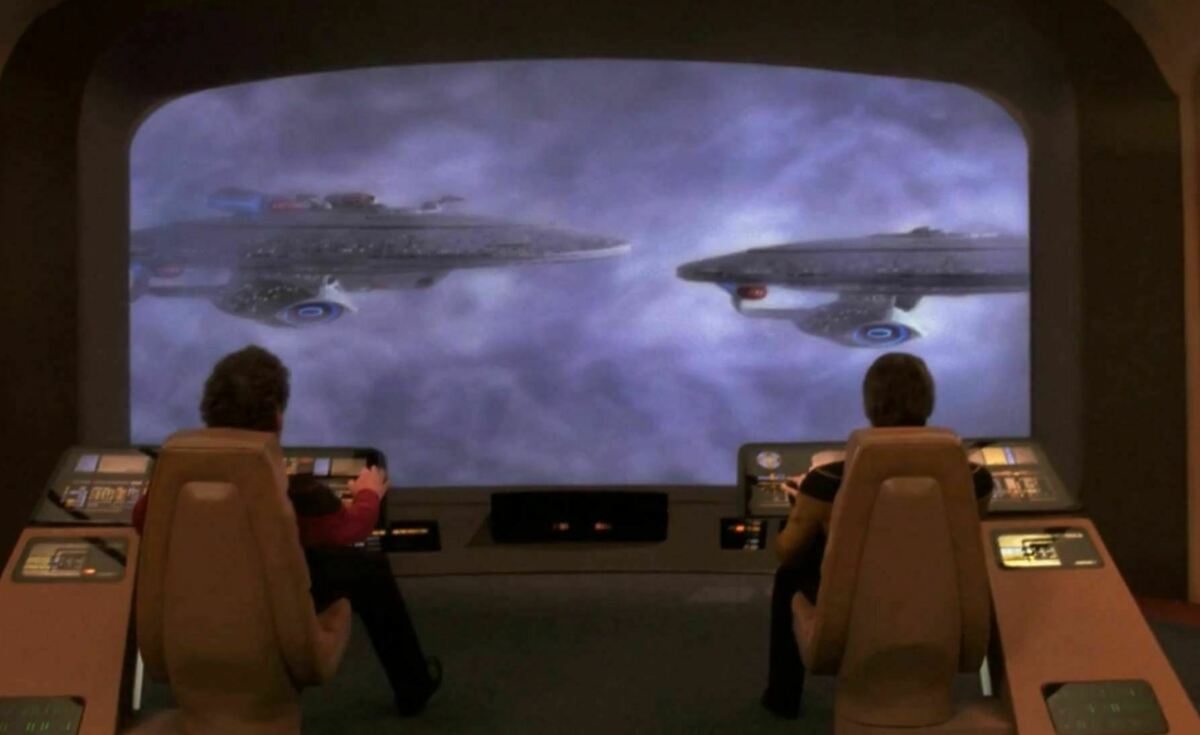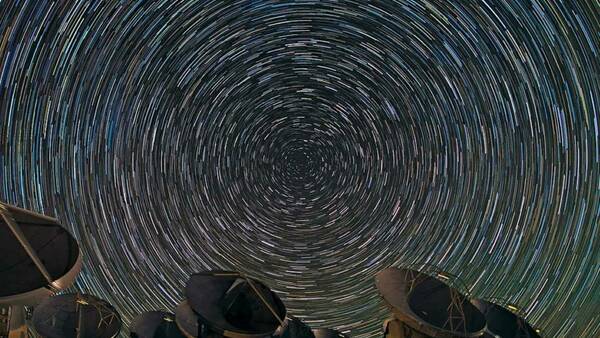If you are an actor at a Hollywood party, and someone asks what you do for a living, it is a reality-check, a reminder, if you needed one, that you are on the bottom rung of a tall ladder. As you might imagine, it can be an uncomfortable position. Early on in that town, I tired of it, and decided to whip up some jauntier personas. I typically traveled with three personas. Having them not only took the edge off, they were also often fun to use. Thus, to the inevitable, “And, what do you do, Tim?,” I would respond variously: “I'm a matador,” or, “I’m a cheese-squeezer at The Alta Dena Dairy,” or, “I play professional hockey.” This last was instant-status gold in the days before the Kings caught on, and the only thing most people in L.A. knew from pucks was that Wolfgang was their favorite.
I am grateful to report going on to steady work in TV and film. And while I have largely refocused professionally, the experience enabled me to add another to that repertoire, I drive the Starship Enterprise through the temporal anomaly. The thing is, I can say this without need of confession afterward. And lest you question use of the present tense, keep in mind: a) reruns, b) online streaming, and c) the temporal anomaly. If that does not ring a bell (or klaxon) the reference here is to the final episode of the Star Trek spin-off series, The Next Generation, the first of three Star Trek series in which I had the good fortune to be cast.
By way of context: I rarely watched the original Star Trek growing up, and held onto an arbitrary impression that the premise was goofy, and execution cheesy. When The Next Generation job came along, I viewed it as little more than a paycheck, and resume enhancement. You might be surprised to learn not all actors actually read their scripts. On this occasion, this one did. The content was intriguing. Given mention of anomalies, particularly of the temporal kind, you might suppose there was some time-trickery afoot, and you would be right. Except, “trickery” does not quite do it justice.
Ronald D. Moore, writer of the two-part, “All Good Things” episode, was using the elements of science-fiction to meditate on the deep mystery that is our perception of time/space. What I was reading was, in effect, dramatized philosophy—a kind of, “Plato Goes To Paramount.” By the time I finished I wondered, “Were the rest of the scripts this good?” It was beginning to dawn on me that science-fiction, per se, is no more deserving of genre stereotyping than John le Carré of being called “a spy novelist.”
+
For kids, kinetic from dawn to dusk, time can move with aching slowness. At the farther end of the span, with kinesis waning, time accelerates, and the clock hands go round at what feels like cartoonish speed. I think adults call this, “time dilation.” I have begun to question though, if in the great in-between, we are not shifting to a metric of existence less to do with the hourglass, than increases in ease and convenience offered by technology. Kierkegaard saw his culture as tranquilized by the trivial. To what degree is our time now conditioned by the comfortable?
From the beginnings of the United States astronaut program, preparation to ascend ad astra has involved the rigorous training in aeronautics, physics, and math we might expect when considering, not just what they do “up there,” but how they get there in the first place. For actors playing astronauts, preparing to ascend to the union-made Milky Way of the sound stage requires a different, some would argue, less rigorous process of wardrobe fittings, hair-stylings, and makeup applications, not to mention the psychic grit needed to alchemize light-years of, “Hurry up and wait!” to small screen gold.
My sister-in-law has made her career at NASA. Over the course of many parties hosted by her and my brother, I had the privilege to meet some awfully impressive young space scientists. A conversation with one typifies a couple of things pertinent to this reflection. As he described the responsibilities of his job, the enthusiasm was childlike and contagious. Not sure why—he was only in charge of moving NASA’s vehicles around the surface of the moon! This spirit of earnest playfulness is shared by virtually every person I have met from that Agency. The other common, and likewise serious, pleasure is an affection for Star Trek.
I was a little surprised. I thought Star Trek would be a more covert interest. I was wrong. It is out there and never fails to come up, the various series referred to in a shorthand akin to “One, Two, Three” when citing The Godfather trilogy. Moreover, person after person attested that the franchise played no small part in their choice of profession. These are fun events for me, awed as I am by minds able to work this way. A bit of a chuckle for them too, I suspect, my bona fides tantamount to tenure at Star Fleet Academy.
Through these good folks, I began to appreciate Star Trek’s role in a pattern of tech innovation; from the imagination that conceives ideas in fiction, to the bountiful cycle of life-imitating-art-imitating-life. A long list of things we have come to rely on derive from this cycle: cell phones, tablet computers, artificial limbs, the jaws of life, to name but a few. Others, the means to travel at warp speed, for instance, are being engaged right now by the international community of innovators.
+
The best-known space franchises, Star Trek and Star Wars, have the same first name, but a defining difference in temporal orientation. Star Wars begins . . . A long time ago, in a galaxy far, far, away . . . What is about to entertain us in the present, took place in a past that has not happened yet. Not in our universe anyway. Star Trek is simpler, space, the final frontier . . . There is no question: this is about the future. Furthermore, if there is a frontier, and it is truly the last, there must be something of ultimate value beyond it; something not just worth, but perhaps the intrinsic purpose of, our striving—a promised land?
The original series was imbued with the robust humanism of creator Gene Roddenberry, and each spin-off was keen to advance that spirit. Devotees of the franchise will refer to it as utopian, a term coined by a saint of the sixteenth century, and regarded more a red flag by Christians since. It is here that the role of technology enters—and in a big way.
We may not have reached the edge of the final frontier, but it does feel as if we are at a hinge moment. As paradigms slip, slide, and otherwise shift, the geopolitical trend is decidedly secular, and the role of technology ever-more critical. For those who regard themselves as consumers first, and citizens second, this is something of a promise. Those with a reverse priority, and acquaintance with history, will likely take a different view. For such, the prospect of technology concentrating in fewer hands, or of the state assuming the reins altogether, on say the model of China’s totalitarian, hybrid-capitalism, is a real, and present, danger.
By nature, the utopian project is closed to the transcendent. Should technology, therefore, become its proprietary instrument, what odds stack against the brightness of the future? The utopian juggernauts of the twentieth century turned visions to ash with a fraction of the technology we possess today, and will, exponentially, tomorrow. In this, there is no way to pierce the vault of time-space, nor interest. Belief is in humanity. People. And, as the cab driver in the film, Harvey, puts it, “You know what stinkers they can be.” Star Trek itself was not blind to the danger of masters coming to be mastered at their own hands. Indeed, some of its best episodes are parables on the theme.
In truth though, we are only able to believe in humanity because God does. In this, we move from the mood of optimism into the virtue of hope. Yet, optimism in this sense is likely to persist, and technology, with its myriad benefits, to continue displacing the god who gives us things; the transactional god, who, no longer useful, no longer matters. What role then does hope play? The lead, I would say. The human heart will be the human heart. Treacherous above all else, perhaps, but the tabernacle yet, of faith, hope, and love dwelling in virtue’s perichoresis.
In one of his last interviews, Buzz Aldrin described the sensation of blasting off; rocketing into the unfathomable depths of the star-rich heights. Listening, I could not help but wonder how such an experience comports with the Psalmist’s words, “Whither shall I go from Your presence? If I ascend to heaven, You are there.” Each breath is a kind of frontier. The final is crossed as we take our last. Would, in that liminal moment, the prayer of St, Ignatius be our own, “Take, Lord, receive, all is Yours now.” You have given all to me, now I return it. Everything, including time itself. Now. Where, with utopias and personas fled, a Kingdom is met behind the shimmering veil of creation.


